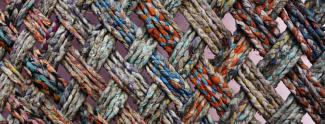Work Weaves the Fabric of Civilization

The fabric of civilization, like all fabrics, is made up of countless tiny threads—each thread the work of someone. Superficially, any given thread might be readily spared or replaced—that could be my job or yours.
Thinking this, we go to work on the margin, so to speak, of culture: Who needs me?
Is this so? Is the fact that each of us might never be missed or easily be replaced proof that what we do does not matter? Not at all! What matters is that we do our work! We are daily providing the threads which join with innumerable others in making civilized life possible.
Consider the furniture around you. It’s congealed work—and worker. Countless hands fashioned it all along the way from raw material to finished product. Our homes are furnished because there is a tightly woven fabric of civilization, or there would be no chair, no sofa, no table, and no car, no street, nothing at all. What civilizes our world is the fact that work is done. Somewhere in the whole mosaic of goods and services our work is being done too. My chair would be no more useful were it autographed by every hand that gave something to its creation! I can use it simply because everyone did their job.
Suppose that the rain drops, one after the other, opted out of a shower because, after all, what does one little droplet amount to? By itself, of course, not much. But the drops have to be in there, one by one, to make a shower; and it’s the showers that make things grow. No matter that the one tiny drop is anonymous or could in theory be easily replaced. In fact, each drop combines with every other to slake the thirst of the earth.
Wholes are possible only because there are parts. No drops—no showers. No tiny threads of work, no civilization. Doing the daily job provides the daily thread: that is what matters.
If we put a painting under a microscope, it becomes apparent that each color exists thanks to innumerable tiny dots. If we analyze a television screen, it is evident that the figures we see are in fact visible because each is composed of small individual units. And if we could trace our automobiles back through all the steps involved in making them, we would find workers’ hands investing workers’ selves every step of the way. All wholes are made up of individual parts. What matters, always, is not who can count the parts or how readily each part could have been replaced. What matters is that the parts are, each of them, there. What matters is that the job, each job, like yours or mine, has a doer and gets done.
Unless many workers just like ourselves did give themselves to making the chairs we are now sitting on, we would be sitting on the floor. Unless, of course, nobody ever invested himself in making us a floor. Then we would be sitting on the grass out in the backyard—unless nobody ever planted and mowed the grass! In a world without work being done by countless and anonymous someones, we would all be Tarzans swinging from tree to tree.
The day we went to work we locked hands with humankind in weaving the texture of civilized life—and our lives each found the key to meaning.
Our thread counts because it is done!
The following is an adapted excerpt from Work: The Meaning of Your Life by Lester DeKoster. It is reprinted here with permission from Christian’s Library Press.
- Log in to post comments
